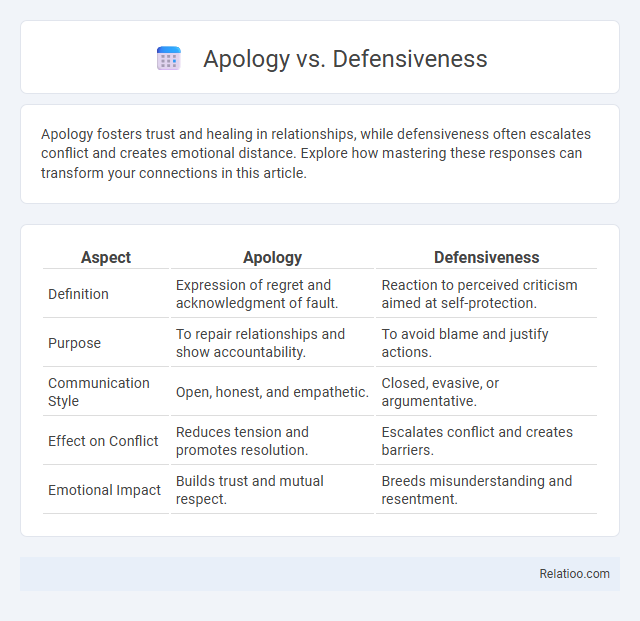Apology fosters trust and healing in relationships, while defensiveness often escalates conflict and creates emotional distance. Explore how mastering these responses can transform your connections in this article.
Table of Comparison
| Aspect | Apology | Defensiveness |
|---|---|---|
| Definition | Expression of regret and acknowledgment of fault. | Reaction to perceived criticism aimed at self-protection. |
| Purpose | To repair relationships and show accountability. | To avoid blame and justify actions. |
| Communication Style | Open, honest, and empathetic. | Closed, evasive, or argumentative. |
| Effect on Conflict | Reduces tension and promotes resolution. | Escalates conflict and creates barriers. |
| Emotional Impact | Builds trust and mutual respect. | Breeds misunderstanding and resentment. |
Understanding Apology: Definition and Importance
Understanding apology involves recognizing it as a sincere expression of regret for a mistake or wrongdoing that acknowledges the impact on others and fosters trust in relationships. Unlike defensiveness, which seeks to avoid blame and deflect responsibility, an apology requires humility and the willingness to own your actions. Your ability to apologize effectively is crucial for emotional healing, conflict resolution, and maintaining healthy communication.
What is Defensiveness? Meaning and Impact
Defensiveness is a reactive emotional response where an individual protects themselves from perceived criticism or attack, often by denying fault or blaming others. This behavior can escalate conflicts by preventing open communication and understanding, creating barriers to resolution and trust. Recognizing and managing defensiveness is crucial for fostering constructive dialogue and maintaining healthy relationships.
Key Differences Between Apology and Defensiveness
An apology involves acknowledging responsibility and expressing genuine regret, whereas defensiveness is characterized by denying fault or shifting blame to protect one's image. Your ability to deliver an effective apology fosters trust and empathy, while defensiveness often escalates conflict and blocks resolution. Defense refers to behaviors or strategies one uses to protect oneself but differs from an apology by lacking accountability and emotional openness.
Psychological Roots of Apology and Defensiveness
Apology arises from a psychological recognition of fault, fostering empathy and social repair, while defensiveness stems from an instinctive need to protect one's self-esteem and reduce perceived threats. Your ability to apologize authentically is linked to emotional intelligence and vulnerability, signaling accountability and promoting trust. Defense mechanisms activate when individuals feel criticized, triggering automatic responses to shield their identity rather than acknowledging fault or fostering understanding.
The Role of Ego in Responses to Criticism
Ego plays a crucial role in shaping your response to criticism, where an apology reflects humility and acceptance, signaling a lowered ego barrier. Defensiveness arises when ego inflates self-importance, causing you to reject feedback and protect self-image aggressively. Defense, often a strategic response, balances ego preservation with maintaining relationships, allowing you to address criticism without escalating conflict.
Effects of Apology on Relationships
Apology strengthens relationships by fostering trust, reducing conflict, and promoting emotional healing, whereas defensiveness often escalates misunderstandings and damages communication. Your willingness to apologize can de-escalate tensions and encourage empathy, helping repair relational setbacks. Defensiveness, in contrast, tends to create barriers to effective dialogue and hinders resolution, limiting growth in personal and professional connections.
Consequences of Defensiveness in Communication
Defensiveness in communication often leads to misunderstandings and escalates conflicts by prompting individuals to protect themselves rather than listen or resolve issues. Unlike genuine apologies that foster trust and empathy, defensive reactions create barriers to effective dialogue and damage relationships. Consequences of defensiveness include increased tension, reduced cooperation, and a breakdown in emotional connection between parties.
When to Apologize vs. When to Defend Yourself
Recognizing when to apologize versus when to defend yourself hinges on understanding accountability and self-assertion; apologize sincerely when your actions have caused harm, thereby fostering trust and resolution. Defensiveness often undermines communication by reacting emotionally rather than addressing concerns, whereas a well-articulated defense clarifies facts without dismissing others' feelings. You can maintain healthy relationships by balancing honest apologies with clear, respectful self-defense to navigate conflicts effectively.
Strategies to Move from Defensiveness to Apology
Shifting from defensiveness to apology requires recognizing defensive triggers and consciously choosing empathy to validate the other person's feelings. You can employ active listening, acknowledge mistakes without excuses, and express genuine regret to foster trust and repair relationships. Using "I" statements and focusing on solutions instead of blame encourages constructive dialogue and emotional healing.
Building Healthy Communication Through Genuine Apologies
Genuine apologies are crucial for building healthy communication as they demonstrate accountability and foster trust, unlike defensiveness which often escalates conflicts by shifting blame or avoiding responsibility. Defensiveness typically arises as a protective response, creating barriers to understanding and resolution, whereas a sincere apology opens pathways to empathy and reconciliation. Prioritizing authentic apologies strengthens relationships by validating feelings and promoting open, constructive dialogue.

Infographic: Apology vs Defensiveness
 relatioo.com
relatioo.com